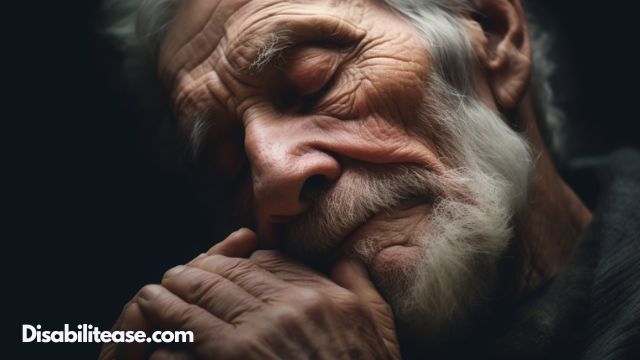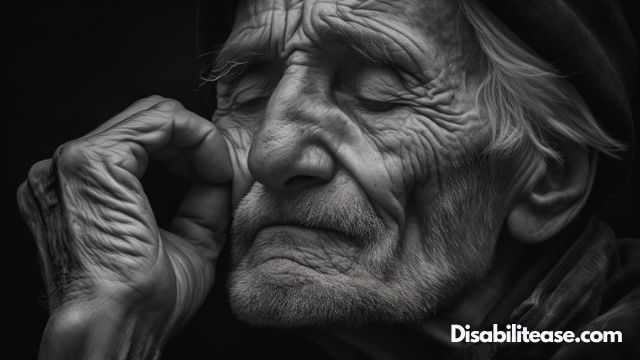As an elderly or disabled individual, it can often feel like life presents more challenges than you have the energy to handle.

You may be struggling with stress, chronic pain, and other physical symptoms that make it difficult to maintain a quality of life.
Mindfulness and meditation offer ways to manage these issues without relying on medication or invasive treatments.
By taking some time each day to focus on your breath and practice mindfulness techniques, you can significantly reduce your stress levels and improve your cognitive functioning.
Additionally, through mindful practices such as yoga or tai chi, you can learn how to better manage chronic pain and other physical symptoms in a way that is both safe and effective.
Table of Contents
Decrease Stress
You can reduce your stress levels with the help of mindfulness and meditation. Mindfulness and meditation have been proven to lower anxiety levels, increase relaxation, and reduce tension in elderly or disabled individuals.
When practiced regularly, mindfulness helps to create a sense of calmness that is beneficial for those who suffer from physical ailments. It also allows them to focus on the present moment instead of worrying about past events or future uncertainties.
Mindfulness and meditation are simple practices that require no special equipment or training. All an elderly person needs is a comfortable spot where they can sit without feeling uncomfortable or strained due to their disability.
From there, they can practice breathing exercises such as counting their breaths or focusing on one particular object in their environment. They can also take time out of each day for guided meditations that help them relax further.
In addition, mindfulness and meditation offer many other benefits such as improved sleep quality, increased focus and concentration, better mental clarity, enhanced self-awareness, decreased feelings of depression and anxiety, and improved physical wellbeing – all of which contribute to overall well-being in elderly individuals with disabilities.
With regular practice over time, these benefits become more profound, leading to a happier life full of joy and contentment despite any challenges they may face because of their age or disability.
Improve Cognitive Functioning

By engaging in mindfulness and meditation, one may be able to see a noticeable improvement in cognitive functioning.
Mindfulness and meditation can help reduce fatigue caused by constant thinking, worrying, and rumination. This can allow the elderly or disabled individuals to think more clearly, making decisions easier as well as helping them remember important information more accurately.
In addition, mindfulness and meditation can also boost concentration levels. It allows the individual to stay focused on areas of interest without having their attention diverted. This could help elderly or disabled individuals attend longer lectures or complete more complex tasks with greater ease compared to before they began meditating.
Practicing mindful breathing exercises is one way for an individual to become aware of their thoughts and feelings while calming their mind simultaneously. By doing this regularly over time, one’s capacity for self-awareness should increase, which helps them identify any mental blocks hindering their cognitive performance.
As a result of this newfound awareness, the individual should be able to make better decisions that are beneficial for them in the long run.
Manage Chronic Pain and Other Physical Symptoms

Feeling chronic pain can be debilitating and overwhelming, but practicing mindful techniques can help you manage it as well as other physical symptoms.
Mindfulness is an accessible technique that anyone can use to find mental relaxation in the midst of physical discomfort.
It involves intentionally focusing on your breath, body sensations, and thoughts without judgment or attachment.
In doing this, you’re able to observe and be present with your experience without being overwhelmed by it. This allows for a sense of acceptance which can decrease the intensity of physical discomforts like chronic pain and fatigue.
Mindfulness meditation also has many benefits outside of managing chronic pain. Studies have shown that mindfulness practice helps reduce stress levels, which can often aggravate physical symptoms like headaches and muscle tension.
Practicing mindfulness will also allow individuals to become more aware of their body’s needs – if they’re feeling tired or in pain – so that they may take care of themselves earlier before the symptoms worsen or flare up too much.
Through mindfulness practices such as breathing exercises, visualizations, guided meditations, and body scans, elderly or disabled individuals may gain relief from their physical discomfort while benefiting from greater self-awareness and stress reduction.
With time and patience, these techniques could become powerful tools for these individuals to live healthier life with less suffering from chronic pain or other physical ailments.
Conclusion
You can see how mindfulness and meditation can be incredibly beneficial for elderly or disabled individuals. With regular practice, they can reduce stress, improve cognitive functioning, and manage chronic pain and other physical symptoms.
It’s an empowering tool that gives them control over their well-being. So why not give it a try? Take a few moments each day to meditate or practice mindful activities. You’ll feel more relaxed and have more energy to enjoy life.
Give it a chance—you won’t regret it!

Hi, my name is Eddie, I am a professional trainer specializing in the elderly population and I’m also a website designer. I love training in the gym, going to the beach, traveling, and having good food.
I combined my love for sport and website designing to make “DisabilitEase” whose purpose is to help elderly and disabled people live a more full and active life, have more fun, and enjoy their unique journey despite any disability.



